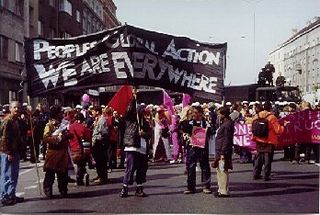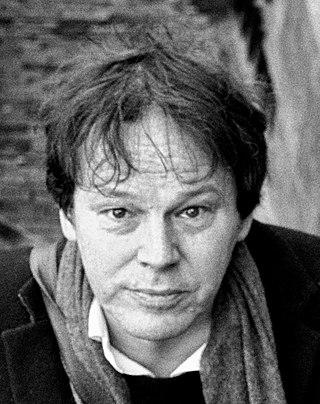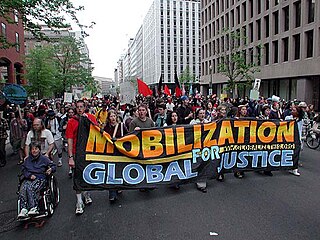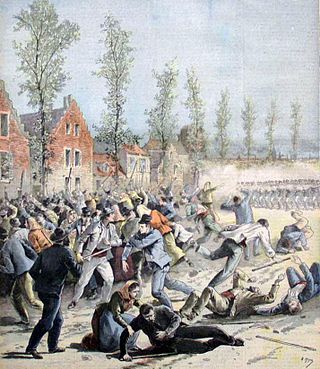
A black bloc is a tactic used by protesters who wear black clothing, ski masks, scarves, sunglasses, motorcycle helmets with padding or other face-concealing and face-protecting items. The clothing is used to conceal wearers' identities from both the police and politically different organizations by making it difficult to distinguish between participants. It is also used to protect their faces and eyes from pepper spray, which is used by police during protests or civil unrest. The tactic also allows the group to appear as one large unified mass. Black bloc participants are often associated with anarchism, anarcho-communism, communism, libertarian socialism and the anti-globalization movement. A variant of this type of protest is the Padded bloc, where following the Tute Bianche movement protesters wear padded clothing to protect against the police.

Peoples' Global Action (PGA) was the name of a worldwide co-ordination of radical social movements, grassroots campaigns and direct actions in resistance to capitalism and for social and environmental justice. PGA was part of the anti-globalization movement.

The 1999 Seattle WTO protests, sometimes referred to as the Battle of Seattle, were a series of anti-globalization protests surrounding the WTO Ministerial Conference of 1999, when members of the World Trade Organization (WTO) convened at the Washington State Convention and Trade Center in Seattle, Washington on November 30, 1999. The Conference was to be the launch of a new millennial round of trade negotiations.

A police riot is a riot carried out by the police; more specifically, it is a riot that police are responsible for instigating, escalating or sustaining as a violent confrontation. Police riots are often characterized by widespread police brutality, and they may be done for the purpose of political repression.

David Rolfe Graeber was an American anthropologist and anarchist activist. His influential work in economic anthropology, particularly his books Debt: The First 5,000 Years (2011), Bullshit Jobs (2018), and The Dawn of Everything (2021), and his leading role in the Occupy movement, earned him recognition as one of the foremost anthropologists and left-wing thinkers of his time.
The Hong Kong People's Alliance on WTO is a grassroots organization that aimed to protest at the WTO Ministerial Conference of 2005 which was held in Hong Kong Convention and Exhibition Centre in Wan Chai North on 13–18 December 2005.

The NYC Ya Basta Collective was a group of anti-globalization activists, based primarily in NYC, active from roughly October, 2000 through October, 2001, inspired by the Ya Basta Association.

Battle in Seattle is a 2007 political action-thriller film written and directed by Stuart Townsend, in his directorial debut. The story is loosely based on the protest activity at the WTO Ministerial Conference of 1999. The film had its world premiere at the Toronto International Film Festival on September 8, 2007. It later screened at the Seattle International Film Festival in May 2008 and received a limited theatrical release on September 19, 2008.
Prefigurative politics are the modes of organization and social relationships that strive to reflect the future society being sought by the group. It is building a new society within the shell of the old by living out the values and social structures you desire for the future According to Carl Boggs, who coined the term, the desire is to embody "within the ongoing political practice of a movement [...] those forms of social relations, decision-making, culture, and human experience that are the ultimate goal". Besides this definition, Leach also gave light to the definition of the concept stating that the term "refers to a political orientation based on the premise that the ends a social movement achieves are fundamentally shaped by the means it employs, and that movement should therefore do their best to choose means that embody or prefigure the kind of society they want to bring about". Prefigurativism is the attempt to enact prefigurative politics.
1984 Network Liberty Alliance is a loose group of software programmers, artists, social activists and militants, interested in computers and networks and considering them tools to empower and link the various actors of the social movement around the world. They are part of the hacktivism movement.
Warcry is an Indian-American environmentalist and anarchist activist, filmmaker, writer and political organizer.
Contemporary anarchism within the history of anarchism is the period of the anarchist movement continuing from the end of World War II and into the present. Since the last third of the 20th century, anarchists have been involved in anti-globalisation, peace, squatter and student protest movements. Anarchists have participated in armed revolutions such as in those that created the Makhnovshchina and Revolutionary Catalonia, and anarchist political organizations such as the International Workers' Association and the Industrial Workers of the World have existed since the 20th century. Within contemporary anarchism, the anti-capitalism of classical anarchism has remained prominent.

General assemblies (GA) were the primary decision making bodies of the global Occupy Movement which arose in 2011. Open to all who wished to take part, general assemblies allowed for an inclusive form of direct democracy. Such assemblies aimed to establish a consensus among all participants.

Alter-globalization is a social movement whose proponents support global cooperation and interaction, but oppose what they describe as the negative effects of economic globalization, considering it to often work to the detriment of, or to not adequately promote, human values such as environmental and climate protection, economic justice, labor protection, protection of indigenous cultures, peace and civil liberties. The movement is related to the global justice movement.

The anti-globalization movement, or counter-globalization movement, is a social movement critical of economic globalization. The movement is also commonly referred to as the global justice movement, alter-globalization movement, anti-globalist movement, anti-corporate globalization movement, or movement against neoliberal globalization. There are many definitions of anti-globalization.

The global justice movement is a network of globalized social movements demanding global justice by opposing what is often known as the “corporate globalization” and promoting equal distribution of economic resources.

Direct action is a term for economic and political behavior in which participants use agency—for example economic or physical power—to achieve their goals. The aim of direct action is to either obstruct a certain practice or to solve perceived problems.

Diversity of tactics is a phenomenon wherein a social movement makes periodic use of force for disruptive or defensive purposes, stepping beyond the limits of nonviolent resistance, but also stopping short of total militarization. It also refers to the theory which asserts this to be the most effective strategy of civil disobedience for social change. Diversity of tactics may promote nonviolent tactics, or armed resistance, or a range of methods in between, depending on the level of repression the political movement is facing. It sometimes claims to advocate for "forms of resistance that maximize respect for life".

Patrick Reinsborough is an American writer, activist, social change theorist and practitioner. He is the co-author of Re:Imagining Change: How to Use Story-based Strategy to Win Campaigns, Build Movements and Change the World and contributor to social movement anthologies including Globalize Liberation: How to Uproot the System and Build a Better World and Beautiful Trouble: A Toolbox for Revolution.

Showdown in Seattle: Five Days That Shook the WTO is a 1999 documentary film, first broadcast in daily half-hour installments, about the November 1999 protests against the Ministerial Conference of the World Trade Organization (WTO) in Seattle, Washington.















